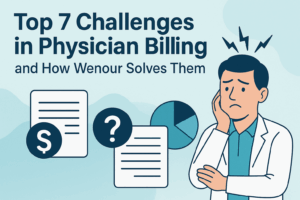Medical billing is a critical component of the healthcare industry, ensuring accurate and timely reimbursement for healthcare services rendered. However, medical billing processes are not without challenges. In this article, we will explore some of the common challenges faced in medical billing and discuss strategies to overcome them effectively.
1. Complex Insurance Policies and Procedures
One of the primary challenges in medical billing is dealing with the complex policies and procedures of various insurance companies. Each insurance provider has its own set of rules, coding requirements, and documentation guidelines. Navigating through these intricacies can be daunting and time-consuming. To overcome this challenge, it is essential to stay updated with the latest coding guidelines and payer policies. Regular training and education for billing staff can help ensure compliance and accuracy.
2. Coding Errors and Insufficient Documentation
Accurate coding is crucial for medical billing. Coding errors, such as incorrect diagnosis or procedure codes, can lead to claim denials or delays in reimbursement. Additionally, insufficient documentation to support the codes used can also pose a challenge. To overcome these issues, healthcare providers should invest in thorough documentation practices. Encouraging healthcare professionals to provide detailed and specific documentation can significantly reduce coding errors and improve the chances of claim acceptance.
3. Claim Denials and Rejections
Claim denials and rejections are common hurdles in medical billing. Denials occur when claims do not meet specific requirements or are not properly supported with documentation. Rejections, on the other hand, happen when claims have errors or missing information. To tackle this challenge, it is crucial to implement robust claim management processes. This includes regular monitoring of claim submissions, tracking denial trends, and conducting timely appeals when necessary. Additionally, adopting electronic claim submission and utilizing advanced billing software with claim scrubbing capabilities can help minimize errors and increase first-pass claim acceptance rates.
4. Timely Follow-Up and Collections
Timely follow-up on outstanding claims and efficient collections are vital for maintaining a healthy revenue cycle. However, the sheer volume of claims and the complexity of insurance processes can make follow-up challenging. Implementing a systematic follow-up strategy with clear timelines and responsibilities is key. Automated reminders and alerts can help track pending claims and ensure timely action. It is also important to establish effective communication channels with payers and patients to resolve any payment-related issues promptly.
5. Evolving Regulatory Compliance
The healthcare industry is subject to evolving regulations and compliance requirements, such as HIPAA and Medicare regulations. Staying abreast of these changes and ensuring compliance can be a significant challenge in medical billing. Establishing a robust compliance program, conducting regular internal audits, and investing in staff training are crucial steps to overcome this challenge. Engaging the services of experienced healthcare compliance professionals or outsourcing compliance audits can provide additional support.
6. Staff Training and Retention
Having a skilled and knowledgeable billing staff is vital for efficient medical billing operations. However, staff turnover and the constant need for training can be a challenge. Investing in ongoing training programs and professional development opportunities for billing staff is essential. This ensures they are up to date with the latest coding guidelines, regulations, and industry best practices. Creating a positive work environment and offering competitive compensation packages can also help attract and retain skilled billing professionals.
7. Technology Integration and EHR Challenges
The integration of technology, including electronic health records (EHR) systems, presents its own set of challenges in medical billing. Compatibility issues, learning curves, and potential system downtime can impact billing efficiency. To overcome these challenges, it is crucial to choose user-friendly billing software that integrates seamlessly with EHR systems. Robust training and ongoing technical support can assist staff in navigating the technology effectively.
In conclusion, medical billing faces various challenges that require proactive strategies to overcome. By addressing complex insurance policies, improving coding accuracy and documentation practices, managing claim denials, streamlining follow-up and collections, ensuring regulatory compliance, investing in staff training, and addressing technology integration challenges, healthcare providers can optimize their medical billing processes. Overcoming these challenges leads to improved reimbursement rates, enhanced revenue cycle management, and increased operational efficiency in healthcare organizations.
FAQs
Q1. How can healthcare providers improve their coding accuracy?
A1. Healthcare providers can improve coding accuracy by investing in staff training, conducting regular coding audits, and ensuring thorough documentation practices.
Q2. What can be done to reduce claim denials?
A2. To reduce claim denials, healthcare providers should implement effective claim management processes, monitor claim submissions, track denial trends, and timely appeal denials when necessary.
Q3. How can healthcare organizations stay updated with evolving regulations?
A3. Healthcare organizations can stay updated with evolving regulations by establishing robust compliance programs, conducting regular internal audits, and investing in staff training and development.
Q4. What role does technology play in medical billing?
A4. Technology plays a crucial role in medical billing, including electronic claim submission, automated reminders, and billing software with claim scrubbing capabilities, which minimize errors and improve efficiency.
Q5. How can healthcare providers optimize their revenue cycle management? A5. Healthcare providers can optimize revenue cycle management by implementing efficient billing processes, addressing challenges promptly, leveraging technology, and focusing on timely follow-up and collections.







